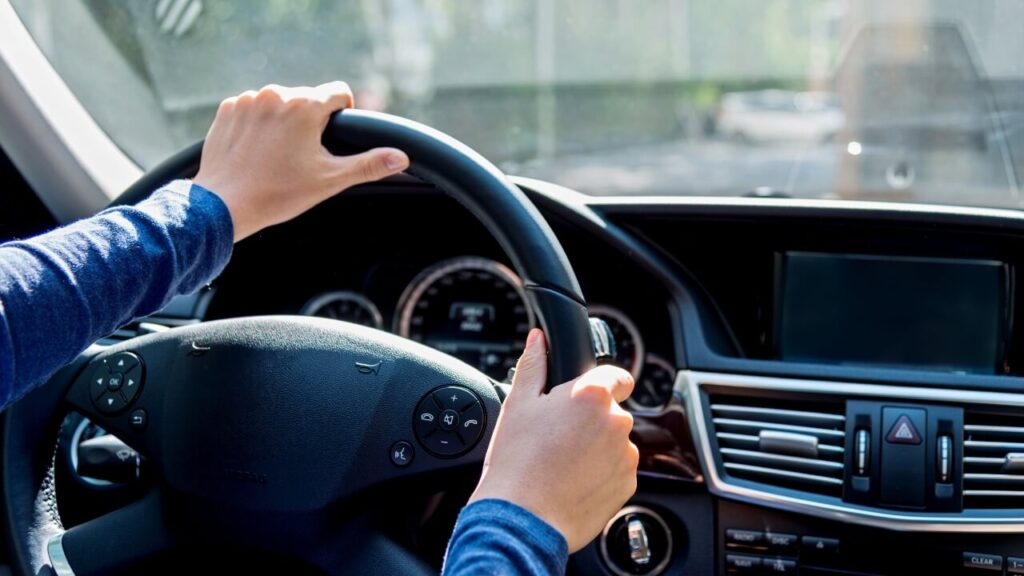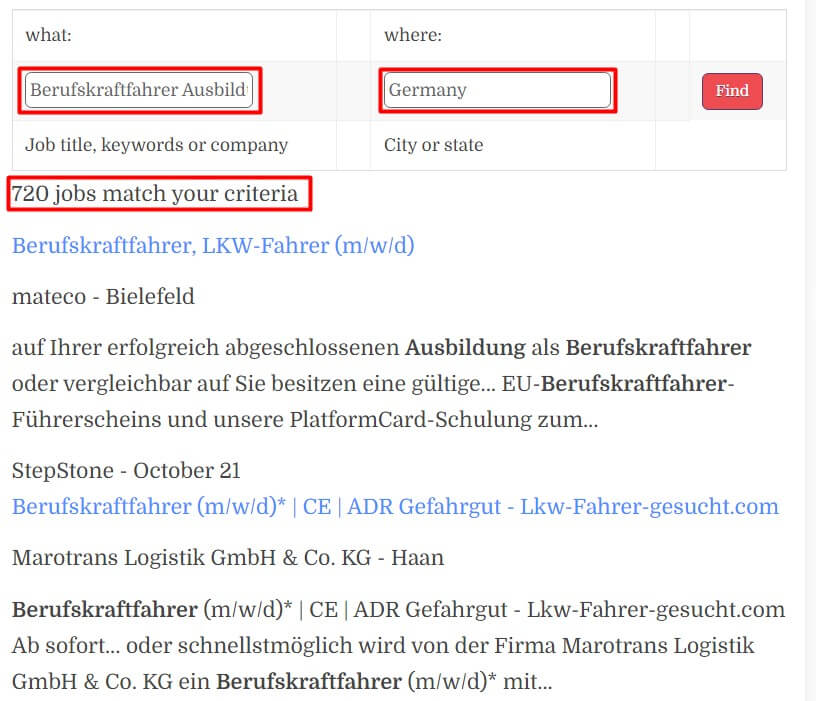If you like driving and want to build your career as a professional driver, Professional Driver Ausbildung in Germany could be a great option. In Germany, this Ausbildung is popularly known as Berufskraftfahrer Ausbildung.
In today’s blog post, we will let you all the details of the Professional Driver Ausbildung in Germany, its merits and demerits, salary during the Ausbildung and salary after completing this Ausbildung, how to get an offer to start a professional driver Ausbildung etc.
So, without further delay let’s get started. We strongly believe you will like this content as usual. Please keep reading to get the benefit of this content till the end.
Professional driver Ausbildung in Germany or Berufskraftfahrer
Basically, as a professional driver, you have to learn how to drive, especially big and heavy vehicles such as buses, trucks, lorries, big rigs etc. In addition, you need to learn some technical aspects which are related to the driving field.

After completing your apprenticeship (Ausbildung) as a professional driver, you’ll be responsible for transporting goods or people across your city or to the far reaches of Germany, or even throughout all of Europe.
During your Ausbildung, you might train as a bus driver for passenger transport, as a freight driver for industrial products, or as a driver for waste disposal vehicles. Regardless of the path you choose, your job is to ensure that your passengers and cargo arrive not only on time but also safely.
So fasten your seatbelt because a career as a professional driver will put your future in motion 😉
How does training to become a professional driver work?
To become a professional driver, you’ll train for three years. The training happens in both vocational school and your training company. It’s called a classic dual apprenticeship (in German: Duale Ausbildung).
During this time, you’ll learn to drive on roads and operate trucks or buses of different sizes. If you start your Ausbildung (apprenticeship) in big companies, you might also work with side loaders, tank trucks or roll-off trucks. These trucks can set up cargo containers at almost a 90-degree angle.
In your first year, you’ll focus on loading and unloading trucks and following safety rules. You’ll also learn how to check the truck before and after a trip and how to handle accidents and hazards.
Throughout your training, you’ll also gain knowledge about creating invoices, documenting the services you provide, and planning trips while considering economic factors.
Also, you have to learn some technical things. If your vehicle gets into trouble you should be able to give a primary check during the journey.
There are also some other Ausbildung in Germany and considered as Best-Paid Ausbildung. You can check them as well.
What do you learn during the apprenticeship?
Of course, you’re excited to start driving, but first, you must understand how the vehicles work. Generally, you’ll begin by learning how the engine, chassis, and mechanical and electrical systems function. In the second part of your Ausbildung, you’ll finally take the driver’s seat, and this will be a big learning experience.
The training vehicles will be either vehicle combinations or Class CE articulated vehicles with a minimum length of 16 meters or a Class D vehicle with a minimum length of 10 meters. Your job will be to safely and efficiently drive these vehicles on public roads.
Here’s an overview of the training contents:
- Traffic regulations
- Vehicle inspection, maintenance and care
- Logistics and trip planning
- Customer interaction
- Contract handling
- Accident response
Classes and categories in German driving license
In Germany, the driving license system is divided into different classes and categories, each of which allows you to operate specific types of vehicles. Here’s an overview of the key classes and categories:
- Class B (PKW-Führerschein):
- This is the standard passenger car license
- Allows you to drive cars and light trucks (up to 3.5 tons) without trailers
- Minimum age to obtain: 18 years
- Class A (Motorradführerschein):
- For operating motorcycles with an engine displacement of at least 50 cc
- There are various subcategories within Class A based on power and age restrictions
- Minimum age varies depending on the subcategory
- Class C (LKW-Führerschein):
- This class is for driving larger vehicles, including trucks and buses
- Class C1 (up to 7.5 tons) and Class C (over 7.5 tons) are available
- Minimum age for Class C1: 18 years; Class C: 21 years
- Class D (Busführerschein):
- For driving passenger-carrying vehicles, such as buses
- Class D1 (smaller buses) and Class D (larger buses) are the subcategories
- Minimum age for Class D1: 21 years; Class D: 24 years
- Class CE (LKW mit Anhänger):
- This allows you to drive large trucks with trailers
- Minimum age: 21 years
- Class DE (Bus mit Anhänger):
- For driving buses with trailers
- Minimum age: 24 years
- Class AM (Leichtkraftrad-Führerschein):
- For light motorcycles and scooters with an engine displacement of up to 50 cc
- Minimum age: 16 years
- Class S (Moped-Führerschein):
- For low-powered mopeds
- Minimum age: 15 years
Please note that the minimum ages and specific requirements for each class/category may vary, and additional training may be necessary for certain endorsements or vehicles. It’s important to consult the local authorities or a driving school for detailed and up-to-date information on German driving license classes and categories.
What does a professional driver do?
Once you’ve gained confidence in your driving skills, a wide array of job opportunities opens up for you as a trained professional driver. These options can lead to diverse experiences in the world of transportation. For instance, as a freight driver, your journeys will take you to various destinations, allowing you to witness the beauty and diversity of the landscapes along the way.

Bus drivers, too, cover significant distances in their routes, providing a valuable service to the community. However, unlike long-haul truckers, they generally don’t have to tackle extended cross-country trips, often sticking to regional or local routes. This means their work typically offers a bit more predictability and the opportunity to return home more frequently.
On the other hand, if you find yourself behind the wheel of waste disposal vehicles, your work will mostly involve shorter trips within the vicinity. This can be quite advantageous as it allows you to spend your evenings at home, ensuring a work-life balance that suits those who prefer proximity to their families and loved ones.
That’s why it’s important to note that your specific job placement will significantly influence your daily routine and lifestyle as a professional driver. Whether you get to undertake extensive journeys across Europe or find comfort in sleeping in your own bed each night hinges on this placement, shaping your overall experience in the world of driving.
What licenses do you obtain during Ausbildung?
Most employers want you to have a Class B driver’s license when you begin your apprenticeship. As you train to be a professional driver, you will get more licenses: Class C and CE.
When you have a Class C license, you can drive vehicles over 3.5 tons and trailers up to 750 kilograms.
The CE license lets you drive big articulated vehicles with trailers or semi-trailers weighing more than 750 kilograms.
What education level is required for this Ausbildung?
Generally, you can become a professional driver with any level of education. However, in practice, most apprentices with a secondary school or high school diploma are hired.
So, while formal education may not be a strict requirement, having a high school diploma can enhance your qualifications. Nonetheless, your success in this profession largely hinges on your sense of responsibility and your ability to consistently deliver on your commitments.
Salary of a professional driver Ausbildung in Germany
The salary for a professional driver apprenticeship (Ausbildung) in Germany varies by year. In the first year, apprentices can expect to earn between €660 to €1,100. Second-year apprentices may receive €710 to €1,195.
On the other hand, for the last and the third year, salaries can range from €760 to €1,255. These figures reflect the earnings during the course of the apprenticeship for Berufskraftfahrer (professional driver) in Germany. For your ease we have added a table below:
| Year | Salary |
|---|---|
| First year | €660 to €1,100 |
| Second year | €710 to €1,195 |
| Third year | €760 to €1,255 |
Is it the profession for you?
Unfortunately, the driving profession is not for everyone. To determine if a career as a professional driver is right for you, consider the following factors:
You should consider becoming a professional driver if:
- You enjoy driving
- Sitting for long periods doesn’t bother you
- Passion for driving
- You are responsible and prioritize the safety of others
You should avoid becoming a professional driver if:
- Traffic jams drive you crazy
- You find driving a family car challenging
- You are impatient
- You prefer not to be alone
Salary of a professional driver in Germany
Professional drivers make about €2,100 to €2,600 per month without extra bonuses. Generally, they work 40 hours a week. They have around 24-30 days of paid leave in one year.
The typical truck driver’s monthly salary is €2,550 gross. Working 40 hours a week, their hourly wage is roughly 15 euros, which is 36 percent higher than the current €12 minimum wage.
If we think about your yearly salary as a professional driver, you can expect to earn between €30,100 and €48,800. On average, it’s around 35,200 euros. If you’re searching for professional driver jobs, you’ll find many openings in Berlin, Munich, Frankfurt, Munich, Hamburg etc places. Nationwide, there are thousands of jobs available for professional drivers in Germany.
How to find a professional driver Ausbildung in Germany
As with other Ausbildung finding a professional driver Ausbildung in Germany has no alternative. That is a search! You have to search. There are many job portals that you can find an Ausbildung.
For your ease, we have made a job search engine so that you can get all kinds of jobs and Ausbildung under one roof. Please check the example below on how to find a professional driver Ausbildung in Germany.
Conclusion
In conclusion, we would like to mention that the professional driver Ausbildung or Berufskraftfahrer training in Germany, offers a gateway to a promising career in the transportation industry. With comprehensive training and practical experience, aspiring drivers gain the skills needed for safe and efficient driving.
As the demand for qualified drivers continues to grow, this type of apprenticeship opens doors to numerous job opportunities. So, if you’re considering a career on the road, Berufskraftfahrer training is the path to build up a great career in Germany.


I want driver jobs with sponsorship
Lit Driver and cleaner and plumber Dnues International school Saudi Arabia